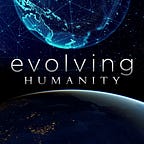How AI and Culture will Change the Future of Personal Development
It was trauma that made me realize I could control my state of consciousness. I was 13. My young heart had just been broken and I was plunged into the deep liquid of love lost.
But in the cavernous gravity of that experience came a single but potent idea: Love, like the kind I had been experiencing the past 6 months — or any other state — could be mastered and then selected at will. That one idea came to define everything about me. From then on every decision was made with the trust that I could select states and behaviors in order to bring about my favorite version of my life and everything in it.
Eventually this fascination wrapped itself around identifying the underlying code of the human operating system for all people. What were the fundamental habits necessary for a person to be successful (satisfied, healthy, and high performing) in all relevant categories of life? How do we ensure that all of us are “at our best” creating successful and meaningful lives for ourselves as well as for the greater common good?
As I developed the model I tested it constantly; I delivered it through telecalls, membership websites, high-impact trainings, private client sessions, behavioral software audios, and videos. As the model became more elegant and more effective, I shared the updates with a community for their use and feedback, iterated, and improved.
However, while a small and willing community interested in “being at their best” is a wonderful thing, it’s never going to be enough. We are either all at our best or none of us truly are.
Unfortunately, it’s a lot of work to learn all the fundamental habits necessary to be the best you and that’s doubly true if you learned the wrong habits the first time. So unless you’re really into personal development the whole thing can end up distracting you from your passion, rather than reinforcing it. Self awareness and best practices should be baked into all our companies and cultural institutions from the ground up.
A wolf doesn’t need to learn how to be a wolf. A human shouldn’t have to learn how to be a human. But when our massive capacity for learning is hijacked by bad programming we get fooled into thinking that we needed “self help” just to be okay. In fact, it’s just the opposite. We need cultural help. We need a culture that supports and ensures a healthy and well-formed version of all of us from the beginning.
So… from the start, my work for the past twenty years was always about how to make “being at your best” a natural part of our culture; the assumed backdrop of our lives.
From a personal standpoint, this means all of us taking control of our culture and its various institutions, especially those of us who run companies or groups that heavily impact other people. It also means that we need to take advantage of the upcoming technological reinvention of our world. AI and superintelligence are coming as is the automation of much of the the workforce. If there’s only a ten percent chance that strong AI (a superintelligence equal to or greater than human intelligence) will be here by 2020, there’s a 90% chance it will be here by 2100*. We need to prepare for that by codifying the things that matter most in a way machines will be able to understand.
Our culture needs to support the best in us, so our technology must be designed with this in mind. We need to identify the fundamental needs of all people. Those needs must then be codified as primary goals motivating our increasingly powerful AI agents. In turn, the system can pattern those behaviors into us through various cultural vectors including unique corporate cultures and the rituals of our daily lives.
My aim with the Human Operating System was to represent the fundamental behaviors that all of us need to be “at our best” so that it could be fed into a machine. If a machine can make sense of that and then use it to shape our days and our lives, we can begin putting our attention where it belongs; not on fixing ourselves, but on doing what we’re most passionate about.
Our passions are what ensure we are doing what we are designed to do in the world. The more everyone is connected to the world as the best, highest, healthiest version of themselves the faster we’ll be able to take control of our lives and the fate of our world. Successful cultures breed successful societies comprised of successful people.
We see this in action on a smaller scale in positive corporate cultures. The most successful companies have the most fertile cultures filled with people carefully selected for their fit into the culture and its world-shaping mission.
In the last few years, as I’ve finished the basic architecture of the H.OS I’ve turned my attention away from primarily serving individuals in order to begin creating the technology for companies that are changing the world for the better. To do this effectively, it’s been critical to get involved in the fields of AI and Corporate Culture Design.
*Taken from a survey cited in Nick Bostrom’s book, Superintelligence
